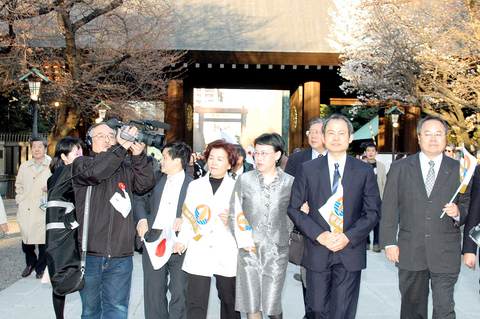Taiwan Solidarity Union (TSU) Chairman Shu Chin-chiang (
Shu immediately came under fire at home for the visit where he was accused of dignifying Japan's militarism in the early 20th century.
Shu, dressed in a business suit, was cheered on by supporters who unfurled the flags of Japan and his party as he entered the Yasukuni shrine which is dedicated to 2.5 million war dead, including 14 convicted war criminals.

PHOTO: CHANG MAO-SANG, TAIPEI TIMES
He called on Asians to "move beyond the grudges and animosity of the past."
"As one Taiwanese and as a leader of a political party I have come here to pay my respect to the soldiers who sacrificed their lives for Japan," Shu said.
"At the same time, as one Taiwanese, I have come here to pay my respect for 28,000 Taiwanese," whose names are enshrined, he said.
Supporters said it was the first known visit to Yasukuni in modern times by a party leader from Taiwan, which was ruled by Japan from 1895 to 1945.
Pilgrimages by Asian leaders are extremely rare to the Shinto shrine in central Tokyo, although military envoys and attaches from countries in other regions have often paid visits.
China has refused any bilateral visits with Prime Minister Junichiro Koizumi over his visits to the shrine.
"Chinese thinking and perspectives don't represent those in Asia. And more so, they don't reflect the views of Taiwan," Shu said. "As a Taiwanese, I don't agree that China still harbors a grudge."
"I wanted to stress this point that the way every nation mourns its war dead should be respected," he said.
The Yasukuni shrine controversially lists the names of 28,000 Taiwanese and 21,000 Korean soldiers, most of whom were forced into service under Japan's colonial rule.
The holy site also lists the names of Japanese civilians who died in fighting.
The populist Koizumi has visited the shrine four times since August 2001, saying he has the right as a Japanese person to choose how to honor the dead.
His visits have triggered furious protests from China and South Korea and led to a string of unsuccessful lawsuits by Asians bereaved in World War II who accused Koizumi of causing them emotional distress.
In Taipei, Aboriginal legislator Kao-Chin Su-mei (
"Japan launched over 160 battles to destroy Taiwan's Aboriginal tribes during its 51-year colony on the island," he said in a statement.
"We strongly protest the TSU visiting the Yasukuni Shrine," he said. "It is already an insult to Taiwan's Aboriginal people that our soldiers were enshrined there."
TSU spokesman Chen Chien-ming (
"We do not agree with the acts and invasions of the Japanese militarism [during World War II] but we should not let hatred persist," Chen said in Taipei.

A preclearance service to facilitate entry for people traveling to select airports in Japan would be available from Thursday next week to Feb. 25 at Taiwan Taoyuan International Airport, Taoyuan International Airport Corp (TIAC) said on Tuesday. The service was first made available to Taiwanese travelers throughout the winter vacation of 2024 and during the Lunar New Year holiday. In addition to flights to the Japanese cities of Hakodate, Asahikawa, Akita, Sendai, Niigata, Okayama, Takamatsu, Kumamoto and Kagoshima, the service would be available to travelers to Kobe and Oita. The service can be accessed by passengers of 15 flight routes operated by

Alain Robert, known as the "French Spider-Man," praised Alex Honnold as exceptionally well-prepared after the US climber completed a free solo ascent of Taipei 101 yesterday. Robert said Honnold's ascent of the 508m-tall skyscraper in just more than one-and-a-half hours without using safety ropes or equipment was a remarkable achievement. "This is my life," he said in an interview conducted in French, adding that he liked the feeling of being "on the edge of danger." The 63-year-old Frenchman climbed Taipei 101 using ropes in December 2004, taking about four hours to reach the top. On a one-to-10 scale of difficulty, Robert said Taipei 101

Taiwanese and US defense groups are collaborating to introduce deployable, semi-autonomous manufacturing systems for drones and components in a boost to the nation’s supply chain resilience. Taiwan’s G-Tech Optroelectronics Corp subsidiary GTOC and the US’ Aerkomm Inc on Friday announced an agreement with fellow US-based Firestorm Lab to adopt the latter’s xCell, a technology featuring 3D printers fitted in 6.1m container units. The systems enable aerial platforms and parts to be produced in high volumes from dispersed nodes capable of rapid redeployment, to minimize the risk of enemy strikes and to meet field requirements, they said. Firestorm chief technology officer Ian Muceus said

MORE FALL: An investigation into one of Xi’s key cronies, part of a broader ‘anti-corruption’ drive, indicates that he might have a deep distrust in the military, an expert said China’s latest military purge underscores systemic risks in its shift from collective leadership to sole rule under Chinese President Xi Jinping (習近平), and could disrupt its chain of command and military capabilities, a national security official said yesterday. If decisionmaking within the Chinese Communist Party has become “irrational” under one-man rule, the Taiwan Strait and the regional situation must be approached with extreme caution, given unforeseen risks, they added. The anonymous official made the remarks as China’s Central Military Commission Vice Chairman Zhang Youxia (張又俠) and Joint Staff Department Chief of Staff Liu Zhenli (劉振立) were reportedly being investigated for suspected “serious